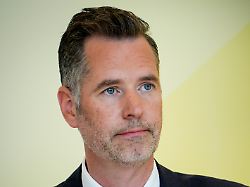Where should you save?
Pleased FDP faction leader counters Habeck’s criticism
08/02/2023 12:14 p.m
Unusual: Business associations and Minister Habeck are unanimously calling for more relief for industry from Finance Minister Lindner. FDP parliamentary group leader Dürr is pleased about this, but attaches this to clear conditions. However, he distances himself when it comes to the price of electricity.
In the traffic light coalition, a debate about relief for the economy is gaining momentum. FDP parliamentary group leader Christian Dürr countered criticism from Economics Minister Robert Habeck of Finance Minister Christian Lindner’s tax plans. Dürr told the German Press Agency: “If Mr. Habeck now proposes faster write-offs, the FDP will be happy to support that. That is a doubly gratifying rethink. Because previously he only spoke of subsidies. The Greens have always rejected better write-offs. Now it should Economics ministers explain where savings are being made.”
Habeck had demanded greater relief from the economy from Lindner. He told the “Handelsblatt” that Lindner’s proposals in the draft law on growth opportunities were not enough. Habeck called for targeted support for investments, tax depreciation and a lower industrial electricity price for a transitional period.
However, criticism also came from eight business associations. They called for improvements to the planned package of measures to stimulate the economy. The so-called Growth Opportunities Act is “correct in its approach and overdue,” said the associations in Berlin. However, there is a “need for readjustment” in some areas.
“The Federal Minister of Finance is fundamentally sending the right signals with the Growth Opportunities Act,” explained Peter Adrian, President of the German Chamber of Industry and Commerce (DIHK). But even if they were fully implemented, the measures would not be enough to adequately solve the current problems of the German economy.
Lindner plans relief of 6.5 billion euros
Adrian explained that the planned premium for investments in climate protection, for example, would be “at least a suitable instrument to encourage investments in energy efficiency” if it were to be implemented easily. However, with the current draft, the Ministry of Finance is planning less “than the promised super write-off”. According to Adrian, there should also be such a depreciation for investments in digital assets.
Lindner wants to relieve the economy with a tax package of around 6.5 billion euros annually. The core element is a bonus for investments in climate protection announced in the coalition agreement. The draft has not yet been approved by the government. From the Ministry of Finance it was said that the economy urgently needs stimuli for better location conditions. This requires a clever supply policy and increased incentives for private investment. With the investment premium contained in the Growth Opportunities Act, the scope provided for by EU state aid law is used.
The Ministry of Finance is “very open” to talking about further tax relief. But fair competitive conditions are also necessary for this. Therefore, all companies and businesses should benefit from relief. A subsidy for a few is not the right way.
The FDP rejects Habeck’s plan for a state-subsidized industrial electricity price for energy-intensive companies. Dürr said that the common goal of the coalition remains to comply with the debt brake. “The direction is right, but that alone will not be enough: If Mr. Habeck wants to follow his words with action, then he should also support us with comprehensive tax relief.” One lever could be the abolition of the solidarity surcharge for business, suggested Dürr. That would be a real boost, especially for medium-sized companies.
With a view to a subsidized industrial electricity price, however, the trade associations contradicted Dürr. Electricity must become cheaper, explained Adrian. To this end, the federal government should initially forego electricity taxes and finance surcharges and fees as completely as possible from the federal budget. In addition, the supply of electricity from renewable energies is to be significantly increased.
